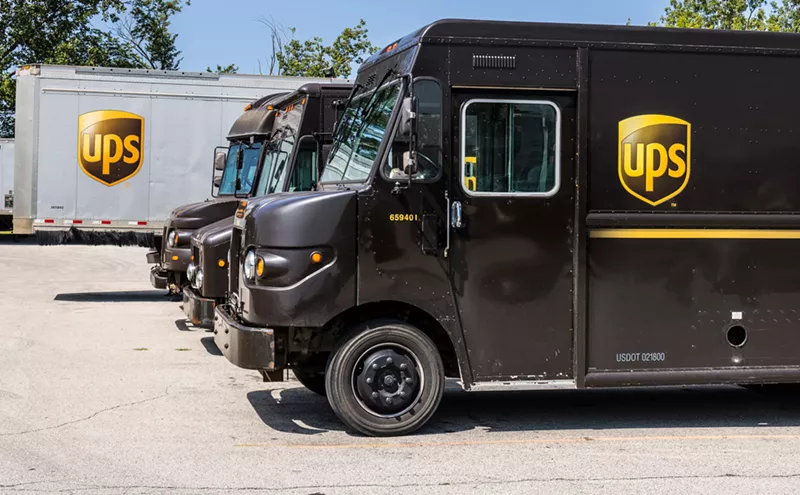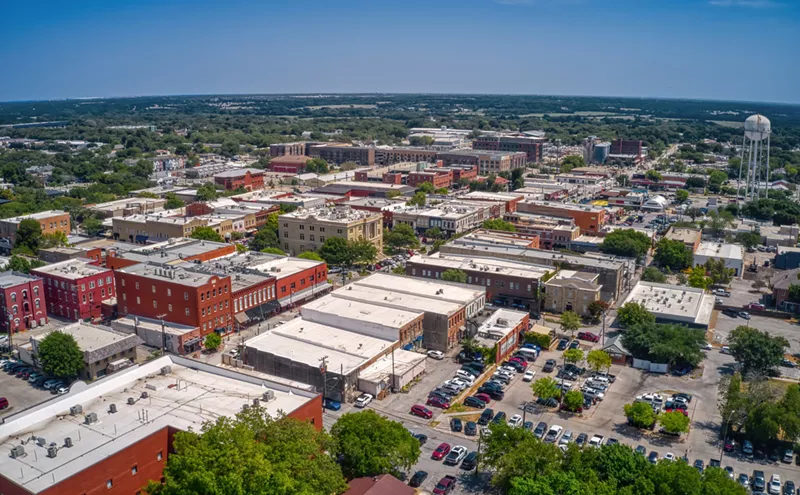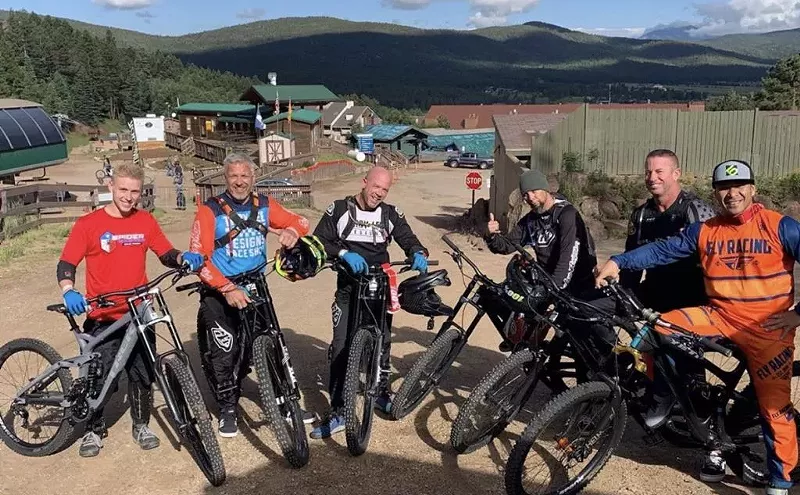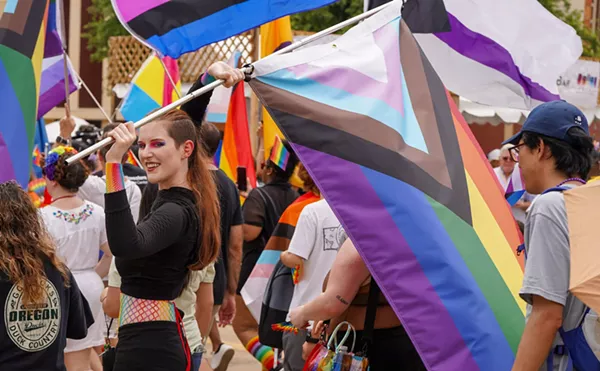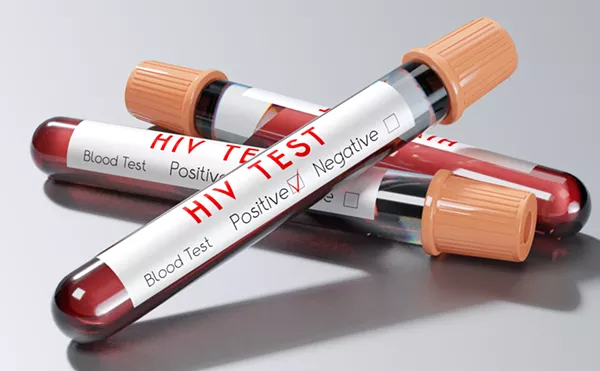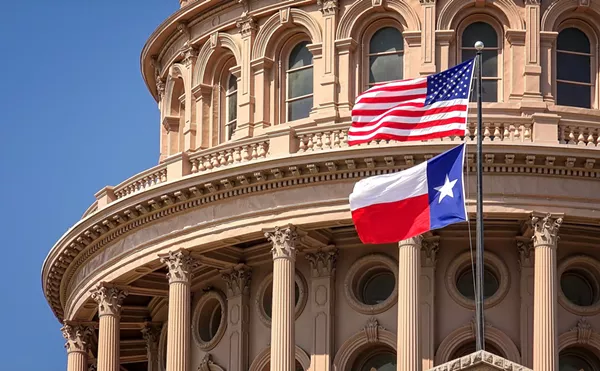They slide into their chairs and complement the scenery--a hip little place with low-slung lights that cast shadows just right on the postmodern tables and wine-red walls. He orders pasta with a heavy cream sauce, gives some to his girl Brittany. He lets her finish his sentences once or twice; other times he needles her.
It's odd, because this is how a normal person acts--someone who wastes away on the couch, letting the television soften his brain, someone who inches along the highway each morning in a plastic-metal coffin just to get to some job he doesn't like.
That's usually not David Williams. He isn't normal. He never was really, and that's truer today than it was when he was growing up. As a teen he was one of the area's brightest, attending the Academy of Math and Science and making thousands of dollars on the side as one of the world's best "Magic: The Gathering" players, a sword-and-sorcery card game for self-avowed nerds that Williams describes as "Pokemon for the advanced." He's constantly on the go now, flying from L.A. to Aruba to Paris to wherever. His passport stamps--Netherlands TaiwanSpain--bleed together into a blur on the pages. So he'll take these quiet moments when he can get them--enjoying the serenity that comes after a storm so big you can't be sure that it ever happened.
"Things have been kinda crazy, yeah," Williams says, rubbing his face. His glasses are off now. His short hair and tight beard make him look like a scale model of Tim Duncan. He hears that from people all the time, he says, even though he'd rather not hear it at all.
"The other day, this woman recognized me," he says. "I'm just walking along, and she says, 'Hey, aren't you that poker guy?' And I say yeah, and she asks me how much I won. I say a few million. So she says, 'I want you to meet my daughter.' There may have been a pause in there, but that's pretty much how it went."
Brittany shoots him a little smirk and snuggles closer. They've been together for three years and share an uptown apartment. She knows this is how things are going to be from now on. Her boyfriend is a celebrity, and there's no going back. People are going to demand his time, shout his name, try to get close to him and take his millions.
More than a month ago, Williams went to Las Vegas for the World Series of Poker. It's the end-all for card players, where amateurs can sit at the tables with professionals. Anyone who puts up the $10,000 entry fee or wins a qualifier tournament known as a satellite can participate. You're as likely to be seated next to someone you've seen making million-dollar decisions on television as you are to be plopped down next to Joe Nobody. Even before this year's WSOP, Williams wasn't a nobody at the tables. He wasn't the guy who drops a few hundred at your local home game because he doesn't know the difference between having balls and having the nuts. He played in the underground card rooms around Dallas and online--a highly skilled player who made more than he lost. Maybe he wasn't a pro just yet, but he was good enough to build a serious bank roll and make people notice.
"Dallas players are some of the best in the world; all they need to do is get out there and show it," says Dallas pro Clonie Gowen (see "Poker Face," by Robert Wilonsky, April 1, 2004). "A lot of these players in Dallas make a good living from playing in the underground games. David is one of them. I remember seeing him pop up around town a lot, and he was faring well. You could tell he could play.
"There's a reason they call it Texas hold 'em. David and so many of the young guys that play in the games around town are really good--good enough that I'm just happy more of them don't make it to events on the pro circuit."
Williams had played in a pro tournament before, but he'd never played at the World Series of Poker. He figured he'd take a shot--if he played well, great. If not, he did his best. His best, as it turned out, was better than all but one player. Williams finished second and won $3.5 million. A few weeks later, he turned 24. He needs just two more semesters to graduate from SMU with a degree in economics and a minor in math. After that he could go to work for the rest of his life...or not. Play poker for the rest of his life...or not. He's young, rich and bright--and he has options.
So that's it, right? End of story? Local kid makes good, wins money, enjoys fame? Not quite. Poker players are different--or at least this one is. Despite the good fortune, he remains tortured, beating himself up over what could have been instead of enjoying what is. The parallel life he could have led preoccupies him at times: He went to Princeton for a while, then left because it wasn't for him; he never knew his dad; and he did well in the World Series, but if he had bested just one more player, he would have been a god instead of just another guy who didn't win it all. He sometimes obsesses over that stuff, and he knows it, but he can't help it, either.
"I think about the final hand every day," Williams says. "I think about it all the time--the way it went down, getting so close to being the champion. I mean, it wasn't about the money. OK, sure, it was about the money--the money was nice. It is nice. But it wasn't entirely about that. Winning was so much more important to me. If first place had paid $3.5 million and second place had paid $5 million, I still would have liked to win. I really wanted to win...I think about that all the time. All the time. The way it went down--I don't know if I'll ever get it out of my head."
Vegas was a madhouse from the moment Williams stepped off the plane in late April. Poker players are generally immune to the commotion. They go to Vegas all the time; it's business for them. The serious ones move there. But if it's possible for poker players to catch the fever that average gamblers get when they walk the Strip for the first time, then it happens during the World Series of Poker.
Since its beginning 35 years ago, the WSOP has been held at Binion's Horseshoe Casino in old downtown Vegas. No one is certain where it'll be next year. Harrah's recently bought the rights to the World Series of Poker when Binion's got into tax trouble. It gave this year's scene a little extra pop; poker greats, first-timers and spectators came wondering if they were witnessing the end of one of the world's grand gambling joints.
Last year, more than 800 people crammed into Binion's to play in the main event at the World Series of Poker, a $10,000 no-limit hold 'em tournament simply called "The Big One." This year, 2,576 wannabe champions entered the event (a byproduct of the poker craze/addiction that many have caught glimpses of on cable or read about). It was a lot to take in, and Williams wasn't sure he was ready. He'd never played in a tournament half that size. Months before the WSOP, he won an online tourney that qualified him for a World Poker Tour event in Aruba. He and Brittany packed their bags and hopped a flight for what he hoped would be quality poker against quality competition. And it was. The bummer was that he lasted only a few hours before getting eliminated.
"That was disappointing because of the way I finished," Williams says. "I don't think I played badly, but I only played for, like, three hours. There wasn't much to it."
It didn't affect his confidence so much as it made him realize how good and lucky you have to be. When he qualified for The Big One by winning an online tournament that offered the $10,000 WSOP entry fee as its prize, he resigned himself to playing without adding too much pressure. That was the plan, anyway.
When he arrived at Binion's that first day, he had to wade through a sea of people just to get to his table. In addition to the thousands of players, there was a crush of spectators and friends and poker freaks who came to watch the spectacle. Security guards had to holler "player coming through" to part the masses. Williams and his buddy Noah Boeken, who was also in Vegas to play in the WSOP, remarked on the energy in the casino--a din saturated the air like humidity.
Williams was calm at the tables, fine as long as there was a dealer and cards in front of him and chips to win. The breaks between rounds were the killers. He had too much time to think about the enormity of it all. He's usually a big eater, but during the WSOP he hardly ate--maybe half a sandwich or a few sips of soup each day. He slept less than six hours a night.
"Oh, for sure, I could tell he was nervous," Boeken, 23, says with a heavy Dutch accent. He's from Amsterdam--part of Williams' cabal of international pals. Williams, Boeken and a few other good friends of the same age met as teens while playing in Magic tournaments all around the world. (Don't laugh. Williams made more than 50 G's in his Magic career.) When they were 17 or 18, one of them watched Rounders, a favorite poker movie among players. Before long, they were playing poker when they were done with Magic. Soon, poker became the primary game for almost all of them. Now, instead of meeting in Russia or Japan to play Magic, they meet to play hold 'em--international swingers, and all before the age of 25. "We've known each other for a long time, and I could see that he wasn't eating too much. But that was natural if you think about it. There was so much on the line. Especially when he kept going. I was out after two days, but he kept going. It was fun to watch. But there was a lot of pressure there. In poker, you make one mistake and it's all over."
For six days--that's how long it took to whittle down the tournament from thousands to a handful--he made precious few mistakes. He played for 12 hours a day. During the breaks, he'd get together with Boeken and Boeken's friend from Amsterdam, Marcel Luske, a 51-year-old considered to be one of the best in Europe (he took 10th at this year's WSOP, winning $373,000). Williams, Boeken and Luske would work through hands together and talk about strategy.
It was an invaluable resource for Williams to have Luske as his de facto coach. At one point, when there were only 50 players left in the tournament, and Williams was on a short-stack (poker-speak for having few remaining chips), Luske took him aside for some counseling. He told his young friend that he was going to have to play a hand that he didn't want to, something like ace-nine off-suit, meaning two dissimilar suits. (Poker for dummies: When playing hold 'em, two cards are dealt facedown to each player. Then three cards come faceup in the middle of the table for community use--called the flop. Then a fourth community card is dealt followed by a fifth and final community card known as fifth street or the river. Between each round there's betting. In no-limit hold 'em, at any point you can bet everything you have. The winner is the player who can make the best five-card hand out of his two hole cards and the five community cards.)
With 10 or so players at a table, ace-nine off-suit isn't a terrific starting hand. But when you don't have many chips left, and you have good position (you bet after most of the other players have acted), it's worth risking it all and hoping for the best. When Williams returned to his table, his first hand, remarkably, was ace-nine off-suit. He played it for all his chips and doubled his stack by winning the hand against former WSOP champion Dan Harrington. "[Luske] didn't have to help me," Williams says. "It didn't help his chances to win it all by making me better, but he did, and I can't thank him enough."
"I was coaching him a little bit because he's a friend of a friend, and he became my friend," Luske says. "He was nervous, and I was just trying to calm him down a little. I felt sorry for him--not because of the way he plays. He plays good. But I felt sorry for him because he was so nervous. I felt sorry for him as a human. It was like taking someone to the dentist for the first time. You try to tell them it will be OK and make them feel better. But then he settled down and played really good."
David's mom, Shirley Williams, was there to witness it all. She had come to Vegas for the first few days of the tournament, planning to leave if her son got knocked out or if he wasn't playing well. Instead, he kept playing well, and she kept extending her stay. On the fourth day, she went to the airport, ready to go back to work as an airline attendant for Delta. David asked her not to leave. She said she'd hang around as long as he wanted, even though her bag had already been checked on her flight and shipped off without her. Unfazed, Shirley bought toiletries at Walgreens to hold her over until they rerouted her luggage.
It was worth it. Shirley is a poker nut just like her son. She got into it around Thanksgiving when she heard David was playing seriously.
"I was a little worried that he might lose money, and I asked him about it," Shirley says. "He said--they weren't his exact words, but you'll get the idea. He said, 'No, Mom, that would be an addiction, and I don't have that.' He told me not to worry, and I trust him."
Before long, she found herself watching reruns of the World Series and reading books about poker. Now she talks about cards with her son and even plays in low-limit casino games when she can find the time. For Shirley, watching her son play against, and beat, some of the very same players she'd seen on television was almost too much. "I got to meet all my favorites," she gushes.
They met Shirley, too. As the tournament went along, she became a fan favorite. People shouted her name. ESPN, which was taping the event for broadcast starting July 6, interviewed her about her son and poker. By the end of the tournament Shirley was every bit as popular as her baby boy. "She was more popular," David counters. "People actually said to me, 'Oh, you're Shirley's son. I heard about you.' I was a fan favorite by the end, and that was because of my mom. It was so great, because if I needed a card to win a hand, my mom would start chanting for it, and then the crowd would start chanting right along with her. At one point, when I was short-stacked, I needed a 10 or a club to double up, and the crowd started chanting with my mom: '10, club, 10, club.' It was awesome to be the fan favorite--for her and me."
Brittany came out, too--she lost her job as a manager at the Electrique Boutique over it--along with some other friends who made the trip to watch David scream toward poker immortality. When he made the final table--a benchmark for poker players that, if achieved, gets their name whispered reverently forever after--the reality hit them hard. There were TV cameras everywhere, and the room was packed so tight you wondered if there was enough air to go around. One by one the players got picked off, until $5 million in cash was placed on the table and only two players were left to stake claims. One was a Connecticut lawyer named Greg "Fossilman" Raymer. The other was David Williams.
He's never been a nickname guy. Too many poker players have shticks or nicknames or both. Unabomber. Devilfish. The Magician. The Master. There's a never-ending supply of self-promoters with oversized egos. The closest David Williams ever got to a nickname came when he was about 10. Long before he knew what poker was, he wanted to call himself "Ace." Ace Williams. He even approached his mom about getting it changed legally--at 10. She told him to try it out at school and come back later. If he still wanted to be called Ace after that, it would be fine by her.
"The kids at school made fun of me all day long," Williams says, laughing. "It was brutal. That was the end of Ace."
There are 55 people named David Williams listed in the Dallas phone book, but he never had trouble distinguishing himself. As a kid, he'd live with his grandparents when Shirley was flying for Delta. Rather than going outside to play, he'd stay in and mess with a computer game or his Magic cards.
"I was always into intellectual hobbies more than sports," Williams says. "I'm not very athletic, and that's fine. I call it smart and lazy. I just don't like to exert energy."
He grew up in Fort Worth and Arlington, and despite moving around, he always made good grades. Great grades, in fact. During his junior year he attended the Academy of Math and Science at UNT, an advanced placement program for the academic elite that gives college credit. He scored in the high 1,400s on the SAT. When he graduated, he had a high school diploma and two years of college hours. He was accepted by Princeton, Harvard, Cornell, Northwestern and a few others. He chose Princeton, not because he liked it there--he never bothered to visit--but because U.S. News and World Report ranked it No. 1 that year.
He hated it. It was too far from home. And too cold. And too deep in the woods. And too...
"You had to walk a mile just to get to your car up there," Williams says. "Who wants to walk a mile to get to their car? It was too much. Too far. And there were lots of rich kids up there. Too many of them. I'm not rich. I worked in the cafeteria. It kind of made me feel like I was beneath people, and I hated feeling like that."
He lasted until January of his freshman year and then left even though he had a fantastic GPA. He came back to Texas, worked a few jobs, took some time off, played poker, played Magic. After two years away from school, he enrolled at SMU. They took almost all of his credits and started him as a junior. He has a 4.0 GPA at SMU--3.9 overall if you factor in what he did at Princeton, which bugs him.
"That .9 really gets me," Williams says. "No matter what I do, I'll never be able to get that back. I know you think I'm crazy, but it's a matter of personal pride. It's like a guy who's pitching a perfect game, but then he walks one guy, just one, and all of a sudden it's a no-hitter. It's nice to throw a no-hitter, but it's better to throw the perfect game. I'll never be able to get that tiny little percentage back, and that bothers me. I'm obsessive about my grades."
He was asked to be part of the Phi Beta Kappa honor society but declined when he found out it cost $150 to join. "Why do I need to pay them for that?" he asks, incredulous. Through it all, he played increasingly more poker. When an old friend moved to Dallas from Arkansas, they began hitting the underground games on the regular.
But lots of people can play cards. What sets Williams apart is his marketing potential. He has charisma and good looks, intelligence and an ethnic background with crossover appeal. His mother is black. He never knew his father, never even saw a picture. His dad was Iranian. He moved away before David was born. But the blend of cultures gave Williams an exotic look. A marketing firm called Poker Royalty--the same group that represents poker elites such as Howard Lederer and Phil Hellmuth--recognized the possibilities and signed him, planning to peddle his face to any company that might want a poker poster boy to hawk its wares or smile pretty.
"Growing up, I felt more sorry for my mom than anything," Williams says of not having a father around. "She had to do everything for us financially. But my grandparents and my mom did a good job with me. It shapes you, and you figure out who you are. He was never really in my life, so I don't identify with my Persian background much. I consider myself black because I was raised black, so I'm black. But, you know, if my background appeals to people because of my mix, that's cool. I just don't want to be called 'the Tiger Woods of poker' or some stupid shit like that. They already call Phil Ivey that, and it's terrible. But it is cool to be out there doing this, because you don't see many black guys playing poker."
He stops for a second, and a goofy grin--the one Brittany says she sees all the time, the one she says David saves for when he's most comfortable--spreads wide. "Maybe I'll have to make up a nickname to really get things going. What do you think? Something cheesy. Like Dynamite Dave."
It was a long WSOP for Double D. He had to get awfully lucky a few times, but that's a prerequisite for anyone who gets close to winning the coveted bracelet. (Along with an incredible sum of money, the WSOP champion gets his picture on a wall with the past winners and a gold bracelet.)
The night before the final table, he was extra stressed and decided to take a soak in the hot tub back at Camp Bob. That's what he and Boeken called the place where they stayed. A buddy of theirs from Magic has a rich dad with a nice home who offered to put them up. Then, calling it a "nice home" is like calling Ronald Reagan's funeral "a quiet little service." A large mansion serves as the main house, and there are several other dwellings surrounding it for guest use. Palm trees grow all around the property, and there are big pools (that's plural) and a private movie theater spread out over the 8.47-acre compound. It's so plush that the MGM Grand runs a picture of it in its hotel magazine along with a blurb that reads something along the lines of "holy Christ, dawg, you gotta check this spot out."
"It's like a private Disneyland," Boeken explains.
It was a good place for Williams to get his mind right. The day of the final table, he was a little more relaxed, and it didn't hurt that things worked out almost from the beginning. Before he knew it, he and Raymer were the only players left. For the first seven or eight minutes they never saw a flop--one would bet, and the other would fold.
The first hand in which they engaged each other also happened to be the last of the 35th Annual World Series of Poker. It's a hand that's been much discussed on Internet poker sites, one that will be dissected ad nauseam when ESPN airs the final installment.
Williams had ace-four off-suit and only about half of Raymer's chips, a distinct disadvantage when playing heads-up. He decided to play aggressively and led with a $300,000 raise. Raymer casually called with a pair of eights.
"He didn't look at it for too long, so I didn't think he had a pair," Williams says. "A pair of eights, heads-up, is usually a hand where you have to stop and think how you want to play it. Do you want to call or re-raise? But it takes a second."
Williams had what he thought was a good "read" (a combination of calculation, observation and instinct that gives you a feel for what your opponent might be holding). It turned out to be the wrong read--something that happens to every player. It just happened to Williams at the worst possible moment. The flop came down two-four-five. Raymer, in good shape with a pair of eights, craftily checked. Williams, who made a pair of fours, figured the flop didn't help Raymer. He bet $500,000.
"The only hands that beat me there are three-six and ace-three [to make straights], or a five and [a higher] pair would beat me," Williams says. "But...I thought I was ahead in the hand. If not, I had nine outs." (Meaning if he wasn't already ahead, any one of nine cards remaining in the deck could make his hand the winner.)
Rather than call this time, Raymer raised $1.6 million. Williams instantly called. It was the quick reaction that drew the most criticism from poker pundits.
"I'm a quick thinker," Williams says. "I always play like that, and I also thought I was ahead, so it didn't take me much time. I went with my gut--and that's usually the right thing to do. People say I should have slowed down. They say if I had, I would have figured it out. But it's like, no, I still would have called."
The fourth card was the two of hearts. Raymer, holding two pair--eights and twos--bet $2.5 mil. Williams called.
"If I raise there, I don't want to give him a chance to fold," Williams says. "I want to give him another chance to bet at it."
Raymer obliged. The fifth card was the two of clubs. Raymer went all-in, and Williams immediately called. They each had a full house, but Raymer's was better--eights and twos, while Williams had fours and twos.
The whole hand took maybe two minutes. Just like that, Raymer was thrusting his hands into the air and Williams was left to watch another man celebrate.
"Because I play a lot more hands than most people, he probably thought he was in good shape there--that he was ahead or that I was bluffing," Raymer says. "People who judge the play or criticize him are evaluating without fully understanding everything that was going on. But I would imagine that he's probably going to think about it for a while. Anybody would."
This is gambling. Sometimes you guess right; other times your gut betrays you, and if it didn't hurt so much already, you'd punch it good. Plenty of people are going to second-guess him, call him a chump, call him a fluke. They'll say he was lucky, and it'll sound like a slur. And maybe he was lucky, but so what? You'd have to be to get that far, but you'd have to have some talent, too. Some people can always beat the game. David Williams is one of those people. He excels--at school, at Magic, at poker. He wins, possibly because it's fun, definitely because he needs to in order to find peace. Mediocre doesn't work for him--a 3.9 GPA doesn't work for him. You can call it drive or obsession or lunacy--just understand that, whatever it is, it causes Williams to go and go and go, to never be satisfied. People may bet against him to duplicate his WSOP success, but it seems safer to put money on him, because he's going to do something when he's done with school, and regardless of what it is--poker or economics or whatever--it's awfully hard to imagine him failing.
"I don't know that I'll play poker forever," Williams muses back at the restaurant. In about a week, he'll head out on a poker tour that will take him all over the world in order to capitalize on his now-famous mug. Then there's school in the fall and who knows what after that. "Financially, it would probably be smarter to invest the money. Because I'd have to play dangerously large stakes right now to make it interesting. So, it's like, what can be earned and at what potential cost?"
He won't have to worry about that for a while. After the government takes its cut, he figures to clear $2 million to $2.5 million (more than what the winner took home before taxes last year). He's going to buy a car, maybe a Bentley, so he and Brittany can stop sharing her little white Eclipse. He gave his mom a chunk to pay off the house and the bills. The rest of it will pad his future. The only indulgence so far was the Rolex that now lights his wrist. It's a ridiculous combination of platinum and diamonds that demands attention--25 G's worth.
Things are pretty great for David Williams right now. As he pushes what remains of the food around his plate, he agrees and says he knows as much. But just when you think he's moving on, relaxing a little, he regresses slightly.
"I was so close," he says. "There's just no way to describe how it makes you feel when you watch someone else become the champion."
He shoves the last of the pasta in his mouth. At least he has his appetite back.



